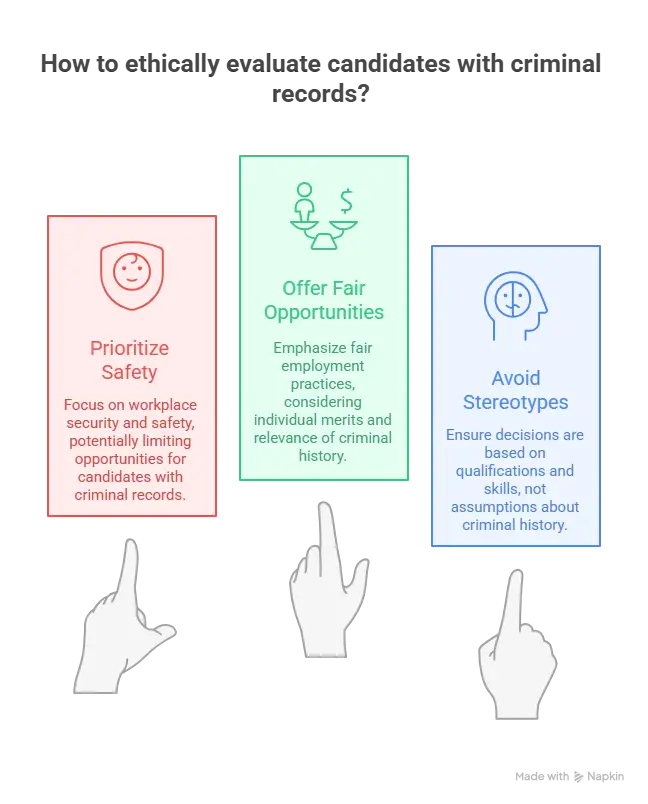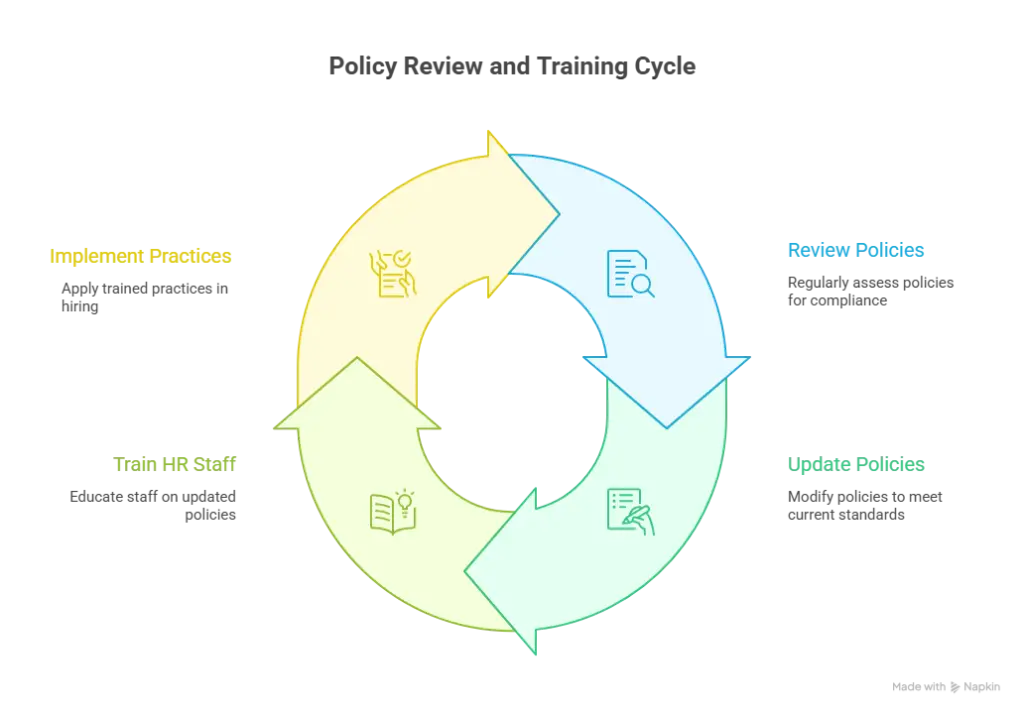Legal compliance and ethical considerations form the backbone of the criminal background check process in HR. It is essential to navigate these aspects with diligence to ensure a fair, unbiased, and legally sound hiring process.
Adherence to Legal Standards
- Compliance with EEOC Guidelines: The Equal Employment Opportunity Commission (EEOC) guidelines serve to prevent discrimination in the workplace. These guidelines emphasize that employment decisions, including those based on criminal records, should not disproportionately impact individuals based on race, color, religion, sex, or national origin.
- Local and Federal Employment Laws: HR professionals must also know and comply with local and federal employment laws. This includes understanding the nuances of the Fair Credit Reporting Act (FCRA), which governs how background checks must be conducted, and other state-specific laws that may impose additional restrictions or requirements.
- Ban the Box Legislation: Many states and localities have enacted Ban the Box laws, which prohibit employers from asking about criminal history on initial job applications. HR must be aware of these laws and modify their application processes accordingly.
EXPERT INSIGHT: As a practitioner of the profession of human resources, I have realized that the use of background checks goes beyond a legal compliance; it becomes a moment to stop, think, and have a thoughtful process of hiring. Each report includes a person possibly fighting to better their situation and build a better future. Our task goes beyond the simple protection of the organization; it becomes finding a proper balance between fairness and accountability. By running background checks openly, with compassion and consistency, we not only ensure we are always compliant with regulations, we work to build a culture of trust, dignity, and second chances. By having these thoughtful and intentional decisions, we have a significant impact on our work to build teams that reflect our brand values. - Charm Paz, CHRP
Ethical Considerations in Using Criminal Records
- Balancing Safety and Opportunity: While it’s important to consider the safety and security of the workplace, it’s equally crucial to offer fair employment opportunities to all candidates, including those with a criminal history. This involves evaluating each case on its own merits and considering the relevance of the criminal history to the job.
- Avoiding Stereotypes and Assumptions: Ethical practice requires HR to avoid making decisions based on stereotypes or assumptions about individuals with a criminal record. Each candidate should be evaluated based on their qualifications, skills, and the totality of their background.

Transparent Communication with Candidates
- Discussing Results Sensitively: When a background check uncovers information that could impact a hiring decision, it is vital to discuss these findings with the candidate sensitively and respectfully. This conversation should be framed as an opportunity for the candidate to provide context or additional information.
- Providing an Opportunity to Respond: Candidates should be given a chance to explain or contest the background check findings. This is not only a fair practice but also allows for the possibility that the background check might contain errors or outdated information.
Documentation and Record-Keeping
- Maintaining Records: Proper documentation of all stages of the background check process is crucial. This includes keeping records of consent forms, the background check report, and notes on any decisions made based on the report.
- Confidentiality and Data Security: All records related to criminal background checks must be stored securely and accessed only by authorized personnel. This is crucial for maintaining the privacy and confidentiality of candidate information.
Regular Policy Review and Training
- Updating Policies: Regular reviews of background check policies are necessary to ensure ongoing compliance with changing laws and best practices.
- Training for HR Staff: Continuous training on legal compliance, ethical considerations, and best practices in conducting and interpreting background checks is essential to maintain a fair and legal hiring process.

In conclusion, the legal and ethical considerations in conducting criminal background checks are complex but critical. Adherence to legal guidelines and a fair, unbiased, and sensitive approach ensure that the hiring process remains just and equitable for all candidates. Regular updates and training are essential to keep pace with evolving laws and societal expectations.
Frequently Asked Questions:
What are the key legal requirements I must follow when using criminal background checks in hiring?
Answer: The key legal requirements include compliance with the Fair Credit Reporting Act (FCRA), which governs how background checks must be conducted and ensures the accuracy and privacy of the information. Adherence to the Equal Employment Opportunity Commission (EEOC) guidelines is also crucial to avoid discrimination based on criminal records. Additionally, be aware of state-specific laws, such as 'Ban the Box' laws and regulations regarding the use of arrest and conviction records.
How can I ensure that my use of criminal background checks is not discriminatory?
Answer: To ensure non-discriminatory use of criminal background checks, follow EEOC guidelines which recommend conducting an individualized assessment for each candidate. This means considering the nature and gravity of the offense, the time that has passed since the offense, and whether the offense is relevant to the job. Avoid blanket policies that automatically disqualify all candidates with a criminal history and treat each case on its own merits.
Can I decide not to hire someone based solely on their criminal record?
Answer: Deciding not to hire a candidate based solely on their criminal record can be risky and potentially discriminatory. It is important to assess how the specific criminal history relates to the job. Consider the nature of the offense, the time elapsed, and the candidate's rehabilitation efforts. Always ensure your decision aligns with EEOC guidelines and state laws.
What should I do if a candidate disputes the accuracy of their background check?
Answer: If a candidate disputes their background check, provide them with an opportunity to explain or provide additional information. Under the FCRA, candidates have the right to dispute the accuracy of their background check report. If they do so, you must investigate the dispute, potentially with the help of the background check provider, and reassess your decision based on the updated information.
How can I maintain confidentiality and privacy with background check information?
Answer: To maintain confidentiality, limit access to background check information to only those who need it for making hiring decisions. Store all documents securely, whether in physically locked files or in encrypted digital formats. Also, be mindful of data retention policies and securely dispose of background check information when it is no longer needed, in compliance with privacy laws.

GCheck Editorial Team
Meet the GCheck Editorial Team, your trusted source for insightful and up-to-date information in the world of employment background checks. Committed to delivering the latest trends, best practices, and industry insights, our team is dedicated to keeping you informed.
With a passion for ensuring accuracy, compliance, and efficiency in background screening, we are your go-to experts in the field. Stay tuned for our comprehensive articles, guides, and analysis, designed to empower businesses and individuals with the knowledge they need to make informed decisions.
At GCheck, we're here to guide you through the complexities of background checks, every step of the way.






